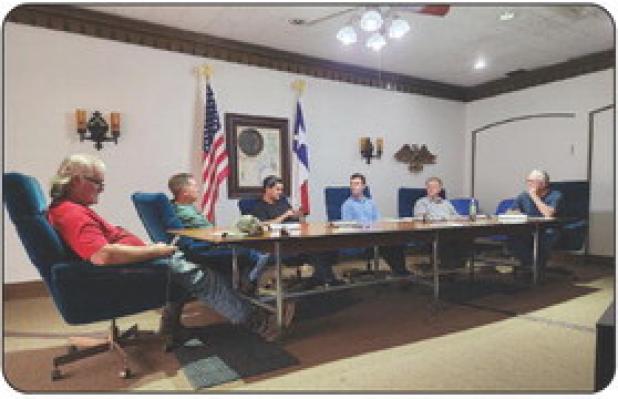
Council ups tax rate to fund infrastructure improvements
The Olney City Council settled on a higher proposed city property tax rate for fiscal 2024 to close a gap in the City’s fiscal year 2024 budget caused by higher energy costs, budget restructuring, and ongoing community improvements.
The Council voted 3-2 to invoke the “de minimis” provision of Texas law that allows small taxing entities to collect $500,000 more in revenue than in the previous fiscal year in spite of a 3.5 percent cap on year-over-year revenue increases set by the Legislature in 2020.
The Council’s proposed de minimis rate of 0.978221, or about 97 cents per $100 property valuation, will produce an expected $1.4 million in fiscal 2024, compared with last year’s rate of 0.685554, or about 68 cents per $100 property valuation for fiscal year 2023, which ends Sept. 30.
Without the de minimis dollars, the City could have raised about $910,053 under the voter-approved tax rate.
Councilman Harrison Wellman said that invoking the de minimis rate would reverse a four-year trend that has seen the City’s tax rate and revenue drop precipitously even as property values soared by 40 percent because of a state law passed in 2020 that caps how much city property tax revenues can rise each year.
“I want to get back to the [0.76240] rate we had in 2017,” before the state law started cutting into the City’s revenues, he said.
The Council expected to collect 4.24 percent more revenue in the current fiscal year compared to fiscal 2022. But costs for electricity, fuel, and vehicle maintenance far outstripped that modest increase, City Administrator Arpegea Pagsuberon said.
“Fuel [and] electricity completely busted every line item for every department,” she said, adding that utility rates were twothirds higher than what the City budgeted for fiscal year 2023.
The 2024 deficit also swelled because the Council also decided to remove about $400,000 from the general fund that the City has been collecting from water and wastewater customers since 2017, Mrs. Pagsuberon said. The Council plans to start spending those funds in the coming fiscal year for repairs to the water towers.
The budget contains no new spending for new capital projects or additional services. It also anticipates higher spending on fuel, utilities, and water in the coming year, Mrs. Pagsuberon said.
The Council deliberated for more than an hour before approving the new, higher rate on a 3-2 vote, with Mayor Pro Tem Tom Parker and Councilmembers Tommy Kimbro and Chuck Stennett supporting it. Mr. Wellman and Councilman Brad Simmons supported a lower de minimis rate of 0.762740, or about 80 cents per $100 property valuation which would have left the City with a budget deficit of approximately $268,979, Mrs. Pagsuberon said.
“If we do not take it up … we will be outstripped by inflation,” Mr. Parker said, arguing that the Council can cut the rate back to 7 or 8 cents per $100 valuation after paying down the inflation-fueled deficit. “Unless we pay as we go we are not going to get healthy.”
“I hate to raise taxes but we need the money,” Mr. Stennett said. “But like Tom says … hit it hard with the top de minimis rate and then lock it at [a lower rate] later.”
Mr. Kimbro agreed, remarking “You’re damned if you do, you’re damned if you don’t.”
If voters challenge the de minimis rate, the City will have to cover the deficit with its savings at a time when water and utility rates could soar and the City’s water revenues could drop under drought regulations, Mrs. Pagsuberon said.
The Council budgeted $45,000 in fiscal 2022 to purchase water from the City of Wichita Falls to supplement the City’s water supply but prices for both water and the electricity needed to pump it into the Lake Cooper reservoir rose and ended up costing $100,000 so far this year with another month left in the budget cycle, she said.
About a third of the City’s approximately 1,600 households claim homestead exemptions, meaning that they will get a sizable property tax cut from the state if voters approve a November ballot measure that increases the homestead property tax exemption to $100,000 from $40,000. The state Legislature also relieved homesteaders of school district maintenance and operations taxes for the next two years. Because of these tax rollbacks, Olney homeowners likely will not see their taxes rise as a result of the proposed local tax increase. The tax cuts will not apply to those who own rental property within the City limits, about 300 to 500 homes, Mr. Parker estimated. “Anyone that owns homes and rents them out is going to get whacked,” Mr. Parker said.
The Texas Taxpayer Research Association explains the de minimis rule as allowing “certain smaller jurisdictions to raise up to $500,00 in new revenue before triggering an automatic election.” Texas law requires taxing entities to hold local elections if they want to raise more than 3.5 percent more revenue year over year. Under the de minimis rule, voters can act to limit the increase by petitioning the City for a tax election, the Association said.
The City Council will hold a public hearing on the proposed tax rate at its Sept. 25 meeting.
